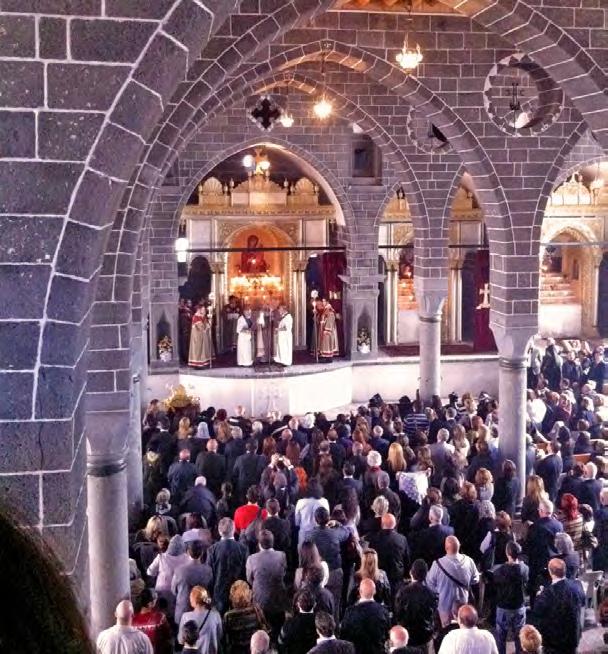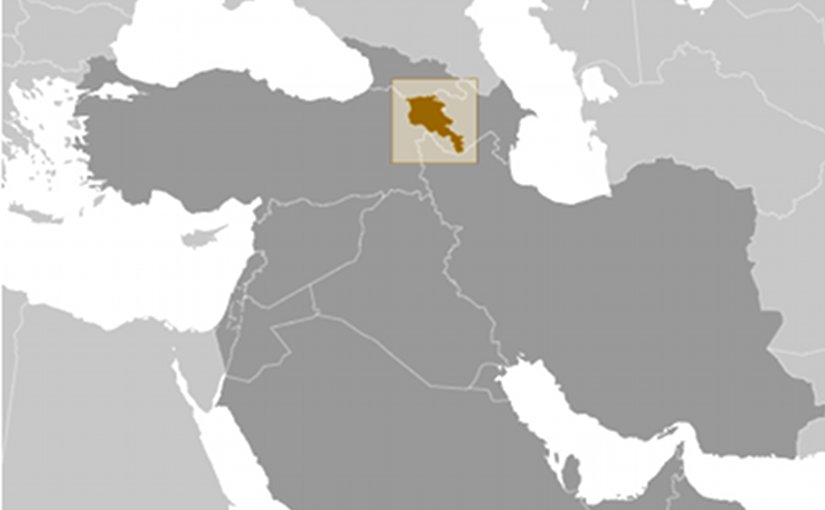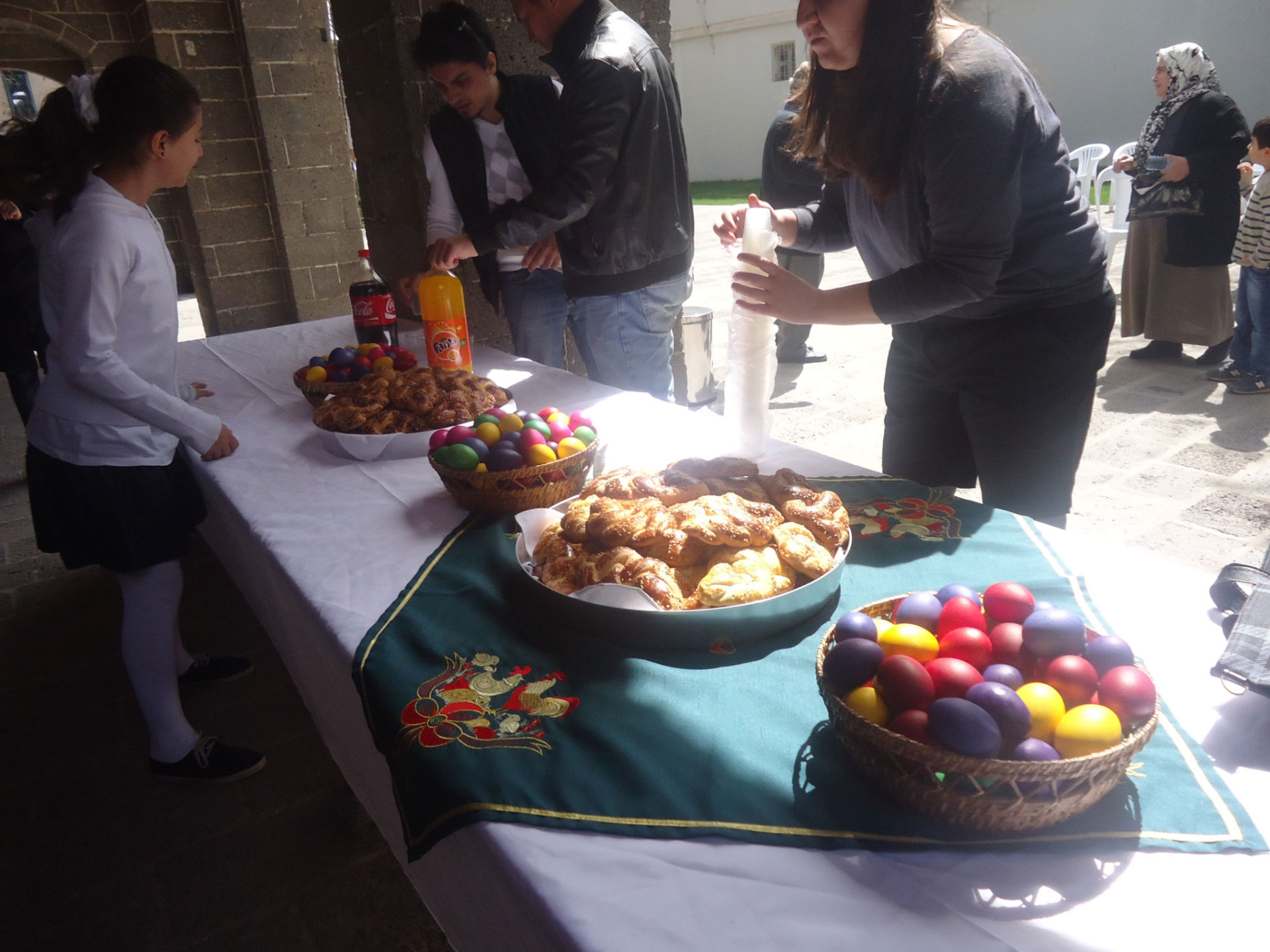I know it's old news, but worthwhile news.

Pilgrims from the Eastern Diocese Take Part In Consecration in Dikranakert
Posted on October 27, 2011 by Editor
The number of participants in the St. Giragos Church re-consecration service exceeded 2,000, with groups of Armenian pilgrims from Istanbul, the US, Armenia, Holland, Germany, Syria and Lebanon present.
DIARBEKIR, Turkey — Last week Archbishop Khajag Barsamian, Primate of the Diocese of the Armenian Church of America (Eastern), led a group of Diocesan leaders on a pilgrimage to the city of Diarbekir (Dikranakert), where they took part in the October 22 re-consecration of the historic St. Giragos Armenian Church
The group, which included the Diocese’s ecumenical director, Archbishop Vicken Aykazian, was scheduled to travel to the historic Armenian region of Van as well, but the earthquake in that region on Sunday afternoon caused a cancellation of those plans.
As reported shortly after news of the disaster broke, the pilgrims from the Eastern Diocese are safe and were unaffected by the earthquake. But in a telephone interview Sunday, Barsamian said, “After such a splendid [reconsecration] ceremony, our hearts were heavy when we learned of the earthquake, and our prayers go out to the victims and their families.”
The restoration and re-consecration of the St. Giragos Armenian Church was a major event in the region, with dignitaries and pilgrims from around the world participating. Constructed in the 16th century, St. Giragos is arguably one of the great sanctuaries of the worldwide Armenian Church. After years of abuse, the recent renovation project — to which a number of diaspora Armenians contributed — has restored it to its former glory.
The group of pilgrims from the Eastern Diocese arrived in Istanbul on Friday, October 21, and had dinner that evening with Archbishop Aram Ateshian, patriarchal vicar of the Armenian Patriarchate of Istanbul, who warmly welcomed the group. Barsamian extended his thanks to Ateshian. On Saturday morning, the pilgrims traveled to Diarbekir (Dikranakert), and on their arrival at the local airport they were welcomed by members of the St. Giragos Armenian Church Parish Council. They proceeded to tour the Old City of Dikranakert — including the ancient St. Sarkis Armenian Church, located in the historic district.
Streets throughout Diarbekir were festooned with flags in Armenian, Turkish and Kurdish reading “Welcome home.” The sentiment throughout the city was festive, warm and welcoming.
The consecration of St. Giragos Armenian Church began at 5 p.m. Ateshian, Barsamian, Aykazian, Bishop Shahan Sarkisian (Primate of Aleppo) and Bishop Sahag Mashalian (from Istanbul) consecrated the five altars. Also present was the Very Rev. Haigazoun Najarian, formerly of the Eastern Diocese and currently the Pontifical Legate for Central Europe. The number of participants in the service exceeded 2,000, with groups of Armenian pilgrims from Istanbul, the US, Armenia, Holland, Germany, Syria and Lebanon present.
Among the dignitaries attending were the United States Consul General of Istanbul, Scott Kilner; the US Consul of Adana, Daria Darnell; the mayor of greater Diarbekir, Osman Baydemir; Abdullah Demirbas, mayor of the city’s Sur Ici section (the area “inside the walls” of the old fortified city) and Mayor Scott Avedisian of Warwick, RI — all of whom were interested in the service and supportive of the historic event.
At the conclusion of the service, the mayor of greater Diarbekir, Osman Baydemir, offered his warm welcome to the visitors — speaking first in Armenian, then in Kurdish, Turkish, English and Arabic. To the Armenian pilgrims he said, “Welcome to your home. You are not guests here; this is your home. Anytime you come here, you are coming to your home.”
“This is a happy and special day not only for you but also for us,” Baydemir continued. “We all know about past events, and our wish is that our children will celebrate together the coming achievements.” Baydemir’s remarks were frequently interrupted by applause, as those gathered were gratified to hear acknowledgement that the city is indeed an historic Armenian center.
A Day of Hope
Baydemir hosted a diner for the clergy and guests, where the US Consul General and the US Consul of Adana were also present.
Vartkes Ergun Ayik, chairman of the St. Giragos Church Parish Council, welcomed the visitors, thanked all those who had participated in the restoration project and invited Barsamian to offer some remarks.
The day’s achievement, said Barsamian, “represents many things to all of us. But most of all, perhaps, it is the result of the mutual recognition and respect of everyone involved, which has animated this project from the very beginning. That is a great reason to be hopeful, and it makes today, above all, a day of hope — a day to look to the future with optimism.”
“As pilgrims from America who have been blessed to be a part of this day, we share in that sense of optimism and hope,” he added. He closed by making presentations of the “St. Vartan Award” to Baydemir and Demirbas. Ateshian likewise expressed thanks to everyone and presented silver awards to both mayors and to the architect of the restoration project. Baydemir concluded the evening by characterizing the occasion as one not only for celebration, “but a day of expressing our apologies for the tragic events of the past. We want to see you come back here not only as tourists, but also as people coming back home.”
Sunday morning witnessed the celebration of the Armenian Divine Liturgy in the newly re-consecrated St. Giragos Church. Ateshian was the celebrant and homilist, and members of the Sts. Vartanantz Church choir from Ferikoy, Istanbul, sang the Komitas arrangement of the badarak. The service took place before another remarkably large gathering of the faithful, which included guest Armenian clergy, as well as the Syrian Orthodox bishop of Adiaben; the representative of Bartholomew I, the Ecumenical Patriarch of Constantinople; mayors Baydemir and Demirbas, and the two American consuls.
To conclude the liturgy, the Armenian hokehankisd (requiem) service was performed for the deceased primates, pastors, altar servers and faithful of Dikranakert.
With the next day’s planned trip to Van (where the group of pilgrims was scheduled to visit the Holy Cross Church on Akhtamar Island) cancelled due to the earthquake, the Eastern Diocese group drove instead to visit the 17th-century St. Kevork Church in Derek, near Mardin. There they met the caretakers who faithfully care for the 300-year-oldBible and hymnal housed within the church. The pilgrims were welcomed by Eyyup Guven, author of a biography titled Kohar — the memoir of an Armenian Genocide survivor from the area.
During their visit the pilgrims were trailed by a sizeable group of local residents, eager to say that they were of Armenian origin.
The group was scheduled to fly to Istanbul on October 25 and to return to the United States later this weekh
Posted on October 27, 2011 by Editor
The number of participants in the St. Giragos Church re-consecration service exceeded 2,000, with groups of Armenian pilgrims from Istanbul, the US, Armenia, Holland, Germany, Syria and Lebanon present.
DIARBEKIR, Turkey — Last week Archbishop Khajag Barsamian, Primate of the Diocese of the Armenian Church of America (Eastern), led a group of Diocesan leaders on a pilgrimage to the city of Diarbekir (Dikranakert), where they took part in the October 22 re-consecration of the historic St. Giragos Armenian Church
The group, which included the Diocese’s ecumenical director, Archbishop Vicken Aykazian, was scheduled to travel to the historic Armenian region of Van as well, but the earthquake in that region on Sunday afternoon caused a cancellation of those plans.
As reported shortly after news of the disaster broke, the pilgrims from the Eastern Diocese are safe and were unaffected by the earthquake. But in a telephone interview Sunday, Barsamian said, “After such a splendid [reconsecration] ceremony, our hearts were heavy when we learned of the earthquake, and our prayers go out to the victims and their families.”
The restoration and re-consecration of the St. Giragos Armenian Church was a major event in the region, with dignitaries and pilgrims from around the world participating. Constructed in the 16th century, St. Giragos is arguably one of the great sanctuaries of the worldwide Armenian Church. After years of abuse, the recent renovation project — to which a number of diaspora Armenians contributed — has restored it to its former glory.
The group of pilgrims from the Eastern Diocese arrived in Istanbul on Friday, October 21, and had dinner that evening with Archbishop Aram Ateshian, patriarchal vicar of the Armenian Patriarchate of Istanbul, who warmly welcomed the group. Barsamian extended his thanks to Ateshian. On Saturday morning, the pilgrims traveled to Diarbekir (Dikranakert), and on their arrival at the local airport they were welcomed by members of the St. Giragos Armenian Church Parish Council. They proceeded to tour the Old City of Dikranakert — including the ancient St. Sarkis Armenian Church, located in the historic district.
Streets throughout Diarbekir were festooned with flags in Armenian, Turkish and Kurdish reading “Welcome home.” The sentiment throughout the city was festive, warm and welcoming.
The consecration of St. Giragos Armenian Church began at 5 p.m. Ateshian, Barsamian, Aykazian, Bishop Shahan Sarkisian (Primate of Aleppo) and Bishop Sahag Mashalian (from Istanbul) consecrated the five altars. Also present was the Very Rev. Haigazoun Najarian, formerly of the Eastern Diocese and currently the Pontifical Legate for Central Europe. The number of participants in the service exceeded 2,000, with groups of Armenian pilgrims from Istanbul, the US, Armenia, Holland, Germany, Syria and Lebanon present.
Among the dignitaries attending were the United States Consul General of Istanbul, Scott Kilner; the US Consul of Adana, Daria Darnell; the mayor of greater Diarbekir, Osman Baydemir; Abdullah Demirbas, mayor of the city’s Sur Ici section (the area “inside the walls” of the old fortified city) and Mayor Scott Avedisian of Warwick, RI — all of whom were interested in the service and supportive of the historic event.
At the conclusion of the service, the mayor of greater Diarbekir, Osman Baydemir, offered his warm welcome to the visitors — speaking first in Armenian, then in Kurdish, Turkish, English and Arabic. To the Armenian pilgrims he said, “Welcome to your home. You are not guests here; this is your home. Anytime you come here, you are coming to your home.”
“This is a happy and special day not only for you but also for us,” Baydemir continued. “We all know about past events, and our wish is that our children will celebrate together the coming achievements.” Baydemir’s remarks were frequently interrupted by applause, as those gathered were gratified to hear acknowledgement that the city is indeed an historic Armenian center.
A Day of Hope
Baydemir hosted a diner for the clergy and guests, where the US Consul General and the US Consul of Adana were also present.
Vartkes Ergun Ayik, chairman of the St. Giragos Church Parish Council, welcomed the visitors, thanked all those who had participated in the restoration project and invited Barsamian to offer some remarks.
The day’s achievement, said Barsamian, “represents many things to all of us. But most of all, perhaps, it is the result of the mutual recognition and respect of everyone involved, which has animated this project from the very beginning. That is a great reason to be hopeful, and it makes today, above all, a day of hope — a day to look to the future with optimism.”
“As pilgrims from America who have been blessed to be a part of this day, we share in that sense of optimism and hope,” he added. He closed by making presentations of the “St. Vartan Award” to Baydemir and Demirbas. Ateshian likewise expressed thanks to everyone and presented silver awards to both mayors and to the architect of the restoration project. Baydemir concluded the evening by characterizing the occasion as one not only for celebration, “but a day of expressing our apologies for the tragic events of the past. We want to see you come back here not only as tourists, but also as people coming back home.”
Sunday morning witnessed the celebration of the Armenian Divine Liturgy in the newly re-consecrated St. Giragos Church. Ateshian was the celebrant and homilist, and members of the Sts. Vartanantz Church choir from Ferikoy, Istanbul, sang the Komitas arrangement of the badarak. The service took place before another remarkably large gathering of the faithful, which included guest Armenian clergy, as well as the Syrian Orthodox bishop of Adiaben; the representative of Bartholomew I, the Ecumenical Patriarch of Constantinople; mayors Baydemir and Demirbas, and the two American consuls.
To conclude the liturgy, the Armenian hokehankisd (requiem) service was performed for the deceased primates, pastors, altar servers and faithful of Dikranakert.
With the next day’s planned trip to Van (where the group of pilgrims was scheduled to visit the Holy Cross Church on Akhtamar Island) cancelled due to the earthquake, the Eastern Diocese group drove instead to visit the 17th-century St. Kevork Church in Derek, near Mardin. There they met the caretakers who faithfully care for the 300-year-oldBible and hymnal housed within the church. The pilgrims were welcomed by Eyyup Guven, author of a biography titled Kohar — the memoir of an Armenian Genocide survivor from the area.
During their visit the pilgrims were trailed by a sizeable group of local residents, eager to say that they were of Armenian origin.
The group was scheduled to fly to Istanbul on October 25 and to return to the United States later this weekh







Comment